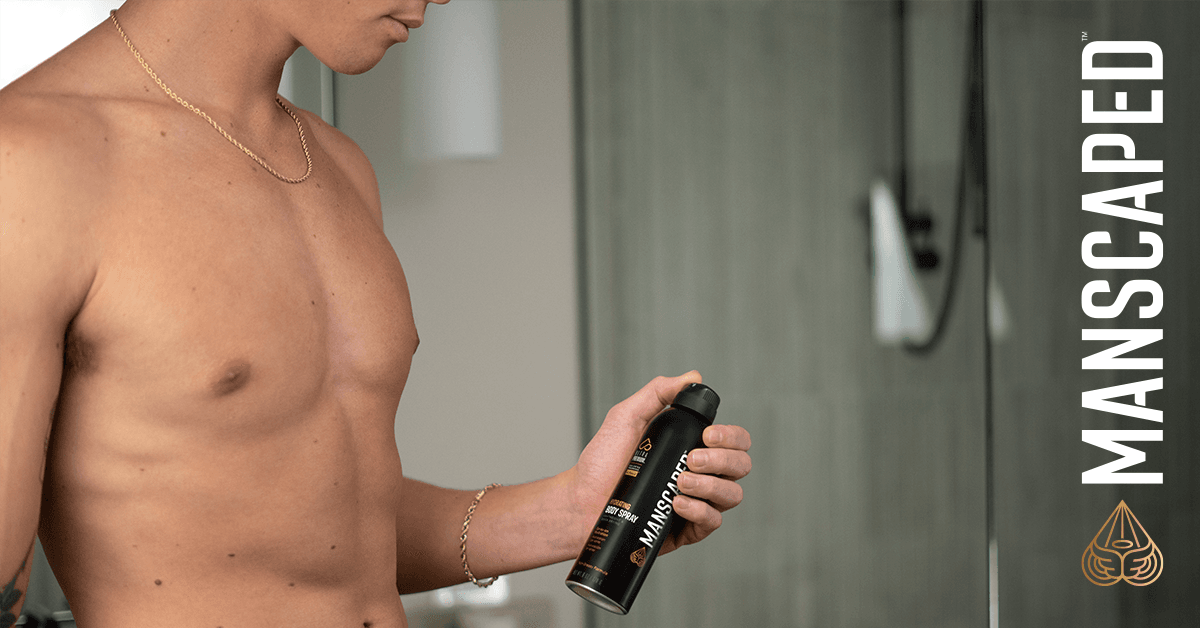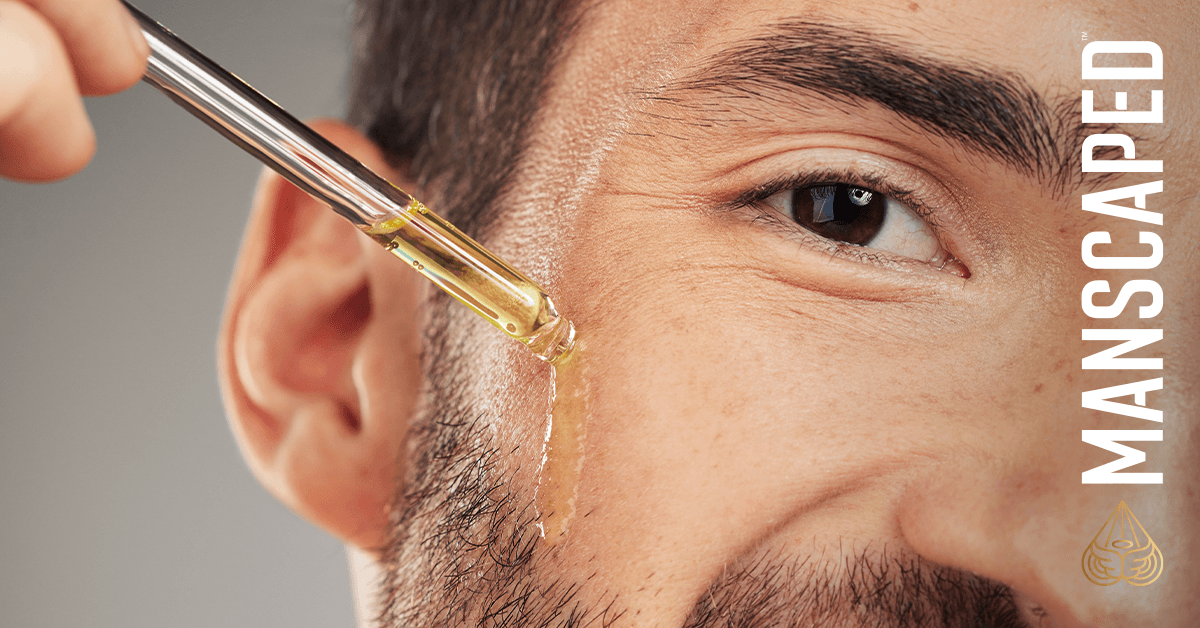
Winter is here, and for a lot of people, it’s a cold one. A colder winter hopefully means more fun in the snow, but it probably also comes with more skin issues that are tied to extreme weather.
Here at MANSCAPED®, we aren’t solving all of the world’s problems—just the most important ones: hygiene and self-care. With that in mind, when we consider problems associated with a cold winter, the first thing that comes to mind is dry skin.
That’s why we’re giving you a complete guide to avoiding dry skin this winter.
1. Wash yourself accordingly
The battle against dry skin is won and lost in the shower. We’ll talk about showers themselves in the next section. First, think about the products you use in the shower. You need hydrating body washes. We make two: UltraPremium™ Body Wash and Crop Cleanser®. Each is specialized, and each will help your skin. A good shampoo and conditioner combo will help your scalp, too.

2. But don’t wash too much
Using a good body wash really does go a long way, but bad shower habits can impede your progress pretty easily. The true essence of showering (when it comes to dry skin) is that less is more, and it really boils down to two things.
Spend less time in the shower, and lower the water temperature.
Allow us to explain.
Most people use tap water to shower. If you’re so rich that you shower with imported bottled water, then you can skip all of the advice in this article. You probably have skincare specialists who take care of everything for you. Congrats.
For the rest of us, tap water is a little hard on the skin. It’s not brutal, but there is chlorine, calcium, and a few other minerals in tap water that will dry out your skin. The rule is pretty simple. The more time you spend in the shower, the more this water will dry you out.
You don’t need to submit to 30-second military showers, but if you could cut from 20 minutes down to 15 minutes, it would definitely help. Also, the environment and your water bill will both benefit from this.
As for temperature, you do not need to take frigid cold showers (although there is some benefit to cold showers). The idea is to dial back on the extreme heat a bit. If your skin is turning red from the heat of your shower, it’s probably too hot. If you wince when you step under the water and have to “get used to it” in order to shower, it’s too hot.
Warm showers are fine. Hot showers dry out your skin.
If you’re really cold and want a hotter shower, a shorter hot shower is the lesser evil.
To recap, shorter, cooler showers offer a lot of benefits:
- Healthier skin
- Lower power bills
- Lower heating bills
- Lower water bills
- Lower environmental footprint
- More time for things out of the shower
3. Moisturize, but you already knew that

Use lotion.
That was easy. Any more tough questions for us today?
But seriously, you already know that lotion and moisturizers are important. To help you stay on top of it, we’ll emphasize a few key points related to moisturizing.
First, you can specialize your moisturizers, and it helps. You can use a different lotion for your face and your feet, and if you really think about that, it’s not such a crazy idea.
You can also use hydrating body spray. When you don’t have the time or freedom to use lotion, it helps. We make one, and we think it’s pretty good.
Naturally, you need a good lip balm for your lips. Please, don’t put generic lotion on them.
Also, if you have a beard, use beard oil. While you do need to moisturize daily, you can use beard oil more sparingly. One or two times a week is usually enough.
There’s nothing revolutionary in this section, but you’re never going to win a war against dry skin unless you moisturize regularly.
4. Turn down the thermostat
Hot water can dry out your skin. Does that mean that other sources of heat can dry you out too?
Yes. That’s exactly what it means, Einstein.
Now, you shouldn’t shiver your way through an entire winter just to make your skin a little softer. That’s extreme. But, there are cases where you can reduce the heat a little bit without suffering, and that will help your skin.
If you keep the heat high enough that you can walk around in your boxers all winter, then maybe you can turn the thermostat down a little, put on some pants, and enjoy healthier skin.
Similarly, if you like a nice, cozy fire, sit a little farther away from it.
Again, warmth isn’t the problem. Heat that dries out the home and your face is the problem. Anything you can do to take the edge off goes a long way.
Remove excess body hair
This won’t solve all dry skin issues under all conditions, but it’s important to remember. If you have excessively dry skin somewhere on your body, then you need to treat it aggressively. You can try moisturizers. You might even need to ward off a skin infection (we’ll talk more about that a little later).
The point is that if your dry skin is hidden by body hair, then it’s usually worthwhile to remove the body hair so that you can get your skin fixed. You can grow the hair back out later. This applies to your luscious Movember beard that you decided to keep. It also applies to groin hair, armpit hair, or any other patch of fur that is making it difficult for you to take care of your skin.
Resolve the dry skin problem. Then, grow your hair however you like.
5. Wear less cotton
This tip is particularly important if you live in colder climates. If you regularly have to bundle up to go outside, then you want to think about reducing the amount of cotton that you keep close to your skin.
You see, even when it’s super cold out, you still sweat. And, when you’re wearing lots of layers, it’s easy for your sweat to get trapped next to your skin. This is where cotton becomes problematic. Cotton is a fiber that naturally traps moisture next to your skin. Since you have extra layers on, the sweat can’t evaporate normally, and you’re basically stewing in a human shower all day.
It’s gross if you think about it.
More importantly, keeping water on your skin all day can actually lead to dry skin. It’s one of those crazy paradoxes of nature.
All of this is to say, if you wear fabrics that wick moisture away from your skin, you nip this problem in the bud. It’s especially useful if your bottom layers are moisture-wicking.
6. Use sunscreen
Then again, not everyone is bundled up all winter. There are a lot of different climates out there, and you might actually see the sun where you live.
If that’s the case, don’t forget your sunscreen. There are plenty of places where you don’t have to worry much about sunburns in the winter. Even so, the sun can dry out your skin, and sunscreen helps to prevent that.
7. Drink more water

Maybe we should have put this first. It’s actually the most important item on the list. The very best way to hydrate your skin is through your belly.
Ok, that sounded weird, but you get the idea. If you have dry skin, try drinking more water. It really will help.
The tricky thing about winter is that we tend to spend less time outside, and we tend to break a sweat less throughout the day. So, we might not feel as thirsty as normal in the winter, and that makes it easy to drink less water on a regular basis.
On top of that, there are times when a small, hot beverage sounds better than a full glass of water.
The end result is that your hydration probably isn’t as good in the winter as it is in the summer, and your skin suffers for it.
8. Keep your hands and feet warm
We’ve been telling you that heat is an enemy this whole time, and now we’re telling you to stay warm?
Well, the human body is complicated.
Here’s the thing about hands and feet in the winter. As they get exposed to dry air, they tend to dry out faster than other parts of your body. It’s because they are extremities.
Now, if it’s cold outside, you’re probably putting on shoes and socks, and that’s good enough for your feet. You might want to remember gloves for your hands, too. That will go a long way in preventing extreme dryness in your hands.
You can also wear gloves when you do the dishes. After all, you’re using tap water for that chore, aren’t you?
As for your feet, they tend to suffer the most when you’re at home. If you let them get a little extra cold, that can cause them to get really dry throughout the winter. So, be a little more diligent about wearing slippers or fuzzy socks, and it’ll make a big difference. Here’s a tip: Moisturize your feet right before putting some socks on. It will help keep the moisture in.
Also, you don’t have to worry about cotton unless you’re bundled up. If you’re just wearing a pair of cotton socks, it should be fine, as there’s nothing trapping the moisture in the cotton. But if you do have a problem with damp feet, switch to wool.
9. Involve a doctor
Hold on there for a second.
We’re not saying that you need to visit the doctor any time you notice a little bit of dry skin. Instead, we’re reminding you that there are skin conditions that can cause excessive dryness, and when you’re bundled up all winter, it can sometimes be easy to overlook them.
So, if things don’t seem right. If your skin isn’t responding to lotion, or even if you’re just worried, then see the doctor. They can provide professional insight that can help you win the war against dry skin.
12.27.22
Share

Featured Articles
- Your Favorite Ball Deodorant. Now with a New Scent: Perservere.MANSCAPED® + TCS for Testicular Cancer Awareness MonthIntroducing The Lawn Mower® 5.0 Ultra TCS Special Edition and TCS Ball Hero BundleThe Dome Shaver™ Pro vs. The Dome Shaver™ Plus: Which Should You Choose?The Chairman™ Pro vs. The Chairman™ Plus: Which Should You Choose?



